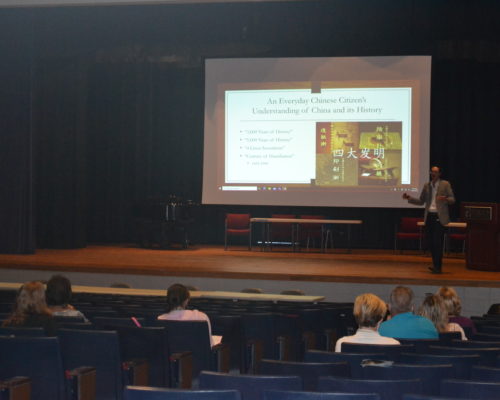UNC’s Santacaterina delivered talk on China’s rise as a world superpower
Students, faculty and staff had an opportunity to listen to a lecture titled Understanding China in the 21st Century: A Historical Perspective by UNC World Scholar Donald Santacaterina.
The lecture focused on how the “Century of Humiliation” led to the rise of the Communist party, which ultimately gave way to China’s rise as a world superpower, as they move towards modernizing their economy, becoming independent, and self-reliant from the rest of the world.
According to Santacaterina, “The Chinese people were focused on protecting themselves by keeping foreigners, foreign interest, and foreign money and foreign ideas out of China because of the idea that they needed to protect themselves from the humiliation of the past.”
Santacaterina’s talk touched on what he called the beginning of the Opium War, which he stated dates back to the 18th century.
“The first Opium War did not solve anything,” said Santacaterina. “The Opium War, from the very beginning was not necessarily about Opium, it was insult, it was about superiority, it was about treating the British with respect. This lead to an actual military conflict.”
The conflict didn’t last long between China and Great Britain, and resulted in a treaty between Hong Kong and Great Britain, giving the British major trading rights along China’s coast.
“It was seen as a unfair treaty by Chinese citizens,” said Santacaterina. “Great Britain came into China to sell Opium, and China fought back… other countries very quickly decided that if Great Britain was going to get trading rights up and down the coast, that they wanted in on it as well.”
This led to second Opium War, but this conflict was not just occupied in Hong Kong, but with French and Indian naval ships moving more into Beijing, as more nations sought to colonialize China for trading purposes, something the Chinese referred to as “carving up China like a melon.”
“These echoes of the Chinese experience continue to come up today in a lot of the narratives that China talks about in terms of their history,” said Santacaterina.
Santacaterina also reflected on many other topics in China’s history including the mostly unheard-of holocaust that happened during World War II when Japan invaded the country.
“I thought it was very informative and enlightening,” said Carol Cummings, one of the attendees in the audience. “We often have preconceived notions about how foreign countries view us and the way that we view them is not always accurate. Attending this lecture today has helped me gain an understanding of how the Chinese view the world based on their history.”
Many others agreed with the sentiment, stating that they walked away with a greater understanding of China, their history and have gained a greater perspective and world view of the country.
“People in China understand their own history as one of greatness, humiliation, and now during the recent past perhaps a little bit more respect from the international community,” said Santacaterina as he spoke on modern day China and the greatness the country has achieved in the global economy and becoming a world superpower.
The lecture was presented by the Global Distinction program at RCC. The program is a partnership between many North Carolina Community Colleges and the World View programs at the University of North Carolina at Chapel Hill.
“Having a World Class Scholar on campus is a real treat,” said Dr. Gaylyn E. Eddy, director of the associate of arts program and religion and philosophy instructor at RCC. “This event will be very valuable for students since it will provide background regarding China, one of our biggest partners and competitors in the global market.













